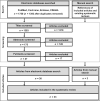Omega-3 Fatty Acid Dietary Supplements Consumed During Pregnancy and Lactation and Child Neurodevelopment: A Systematic Review
- PMID: 34383914
- PMCID: PMC8764572
- DOI: 10.1093/jn/nxab238
Omega-3 Fatty Acid Dietary Supplements Consumed During Pregnancy and Lactation and Child Neurodevelopment: A Systematic Review
Abstract
Background: Maternal nutrition during pregnancy and lactation has profound effects on the development and lifelong health of the child. Long-chain PUFAs are particularly important for myelination and the development of vision during the perinatal period.
Objectives: We conducted a systematic review to examine the relationship between supplementation with omega-3 fatty acids during pregnancy and/or lactation and neurodevelopment in children, to inform the Scientific Report of the 2020 Dietary Guidelines Advisory Committee.
Methods: We identified articles on omega-3 fatty acid supplementation in pregnant and lactating women that included measures of neurodevelopment in their children (0-18 y) by searching PubMed, CENTRAL, Embase, and CINAHL Plus. After dual screening articles for inclusion, we qualitatively synthesized and graded the strength of evidence using pre-established criteria for assessing risk of bias, consistency, directness, precision, and generalizability.
Results: We included 33 articles from 15 randomized controlled trials (RCTs) and 1 prospective cohort study. Of the 8 RCTs that delivered omega-3 fatty acid dietary supplements during pregnancy alone (200-2200 mg/d DHA and 0-1100 mg/d EPA for approximately 20 wk), 5 studies reported ≥1 finding that supplementation improved measures of cognitive development in the infant or child by 6%-11% (P < 0.05), but all 8 studies also reported ≥1 nonsignificant (P > 0.05) result. There was inconsistent or insufficient evidence for other outcomes (language, social-emotional, physical, motor, or visual development; academic performance; risks of attention deficit disorder, attention-deficit/hyperactivity disorder, autism spectrum disorder, anxiety, or depression) and for supplementation during lactation or both pregnancy and lactation. Populations with a lower socioeconomic status and adolescents were underrepresented and studies lacked racial and ethnic diversity.
Conclusions: Limited evidence suggests that omega-3 fatty acid supplementation during pregnancy may result in favorable cognitive development in the child. There was insufficient evidence to evaluate the effects of omega-3 fatty acid supplementation during pregnancy and/or lactation on other developmental outcomes.
Keywords: anxiety; attention deficit disorder; attention-deficit hyperactivity disorder; autism spectrum disorder; cognition; depression; lactation; omega-3 fatty acids; pregnancy; systematic review.
© The Author(s) 2021. Published by Oxford University Press on behalf of the American Society for Nutrition.
Figures
Comment in
-
DHA and Cognitive Development.J Nutr. 2021 Nov 2;151(11):3265-3266. doi: 10.1093/jn/nxab299. J Nutr. 2021. PMID: 34590117 Free PMC article. No abstract available.
References
-
- Mochizuki K, Hariya N, Honma K, Goda T. Relationship between epigenetic regulation, dietary habits, and the developmental origins of health and disease theory. Congenit Anom (Kyoto). 2017;57(6):184–90. - PubMed
-
- O'Donnell KJ, Meaney MJ. Fetal origins of mental health: the developmental origins of health and disease hypothesis. Am J Psychiatry. 2017;174(4):319–28. - PubMed
-
- Prado EL, Dewey KG. Nutrition and brain development in early life. Nutr Rev. 2014;72(4):267–84. - PubMed
-
- USDA, US Department of Health Human Services. Dietary guidelines for Americans, 2020. 9th ed. Washington, DC: US Government Printing Office; 2020.



